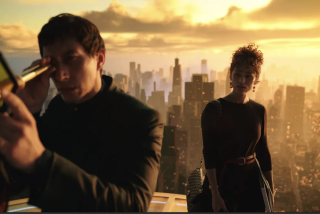Review: ‘Cosmopolis’ money and mind games spin their wheels
“Cosmopolis,” starring Robert Pattinson as a super rich supernova, is an exceedingly self-conscious adaptation of the brooding indictment of the 1% found in Don DeLillo’s novel of the same name. The attempt is earnest, but the material itself resists easy transition because virtually all of the action takes place inside a tricked-out limo and a trickier mind.
It is a disappointment coming from writer-director David Cronenberg, who has proved such a master at mind games. Cronenberg is perhaps too faithful to the book. The topic is provocative and certainly timely, but the film never achieves the incisive power of his best work, “A History of Violence” for one. Even an A-list ensemble that includes Juliette Binoche, Samantha Morton and Paul Giamatti can’t save it.
There are no heroes in “Cosmopolis.” The main protagonist is 28-year-old self-made billionaire Eric Packer (Pattinson). He is by most measures a hollow man — arrogant, indifferent, insolent. But the man who wants for nothing, wants for more. So Eric spends most of the movie driven to greater and greater narcissistic extremes simply to feel anything.
PHOTOS: Robert Pattinson’s career in pictures
The film opens on a Manhattan morning, the lens focused on a line of white limos polished to such a high sheen they are nearly blinding in the bright sun. Eric, in a beautifully tailored suit, stands nearby, his face a porcelain mask broken only by the dark shades he favors in or out of the glare. He’s having a cryptic conversation with Torval (an excellent Kevin Durand), his head of security, who is hyped up about a “credible threat” on Eric’s life. He’d like his boss off the streets, which are already gridlocked by a presidential motorcade. But Eric’s having none of that — “we want a haircut” — he says with all the imperiousness of a spoiled child.
There are really two credible threats to be dealt with — the crackpot who wants to kill him and the lethal game he’s playing with his fortune. It’s a major gamble that involves the Chinese yuan, with billions to be made or lost before nightfall. And arguably Eric’s humanity is on the line as well.
The rest of the film unfolds over the course of the day. All of the movement and events that follow are framed by debates on wealth, self-worth, technology, consumption, love, sex, fate and death. First in the hot seat is Eric’s hard-wired techy partner, Shiner (Jay Baruchel). He sweats and squirms on the limo’s expensive leather seats, just waiting for Eric to pounce and rip him to verbal shreds. It is in this way we begin to get a truer sense of the man.
PHOTOS: Robert Pattinson and Kristen Stewart through the years
One by one, Eric’s high-end minions slip into the limo like loyal subjects, have their say, then disappear back into the city. Binoche plays his art dealer Didi Fancher, who has issues with his desire to buy the Rothko Chapel. She has no issues with his more carnal desires. Before the sun sets, his “theorist” (Morton) will show up cool and clinical, as will his financial advisor (Emily Hampshire), sweat-soaked from a jog and primed with advice, and consent. While Eric fiddles, Rome, or in this case Manhattan, burns. Literally rebellion is unfolding just beyond his tinted windows. Ultimately there is the barbershop, the haircut and a final debate with Benno Levin (Giamatti), a former employee who is set on making the young titan atone for his sins.
It is an extremely demanding role for Pattinson as the king holding court in virtually every scene. The actor has made Eric icier than “Twilight’s” Edward Cullen, the sexy but bloodless vampire that continues to define Pattinson’s career — try as he might to move beyond it. But the heartlessness necessary to make us hate Eric, or fear him, is just not black enough to be believable. There’s a fine art to playing the soulless that not many actors can pull off, though Kevin Spacey comes to mind as one who consistently can, most recently in another financial disaster film, “Margin Call.”
Cronenberg, collaborating again with cinematographer Peter Suschitzky, has created a surreal look that suits “Cosmopolis,” capturing the contrasts between Eric’s cloistered car and the rebellion and rage on the street in intriguing ways. The film as a whole is a study in contrasts — the beautiful versus the ugly; rich and poor; sane and deranged. But DeLillo’s brilliant analysis of the destructive power of wealth that took such seductive hold on page has a tough time gaining traction on screen. In this visual world, the debates become pedantic — ranging from esoteric provocation at best to college-professor tedious at worst. Since so much of the movie hangs on their power, so goes “Cosmopolis.”
ALSO:
Whitney Houston’s presence felt in ‘Sparkle’
9 things we learned from the ‘Cosmopolis’ trailer
Kristen Stewart could still reprise ‘Snow White’ role, studio says
---
‘Cosmopolis’
MPAA rating: R for some strong sexual content including graphic nudity, violence and language
Running time: 1 hour, 48 minutes
Playing: At the Landmark, West Los Angeles
More to Read
Only good movies
Get the Indie Focus newsletter, Mark Olsen's weekly guide to the world of cinema.
You may occasionally receive promotional content from the Los Angeles Times.








